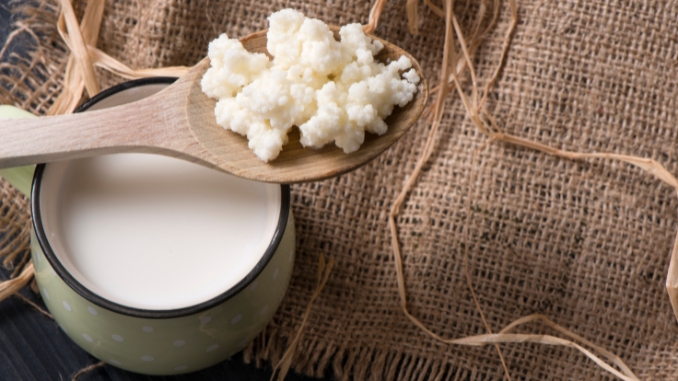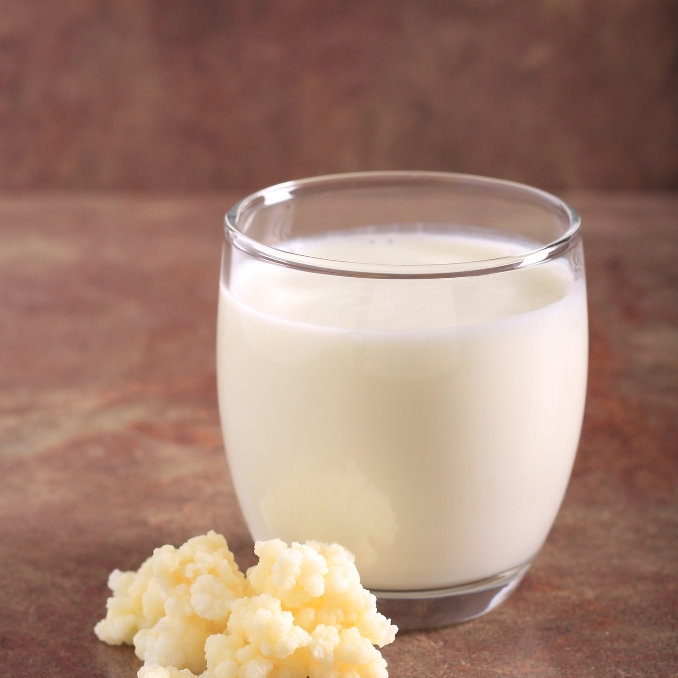I’ve experimented with both kefir and Greek yogurt in my diet. Kefir became my go-to for morning smoothies, while Greek yogurt was my favorite for quick snacks. Incorporating both yogurt and kefir gave me a balanced mix of probiotics and protein.
Fermented dairy products [1] like kefir and Greek yogurt are popular staples for their health benefits and versatility. But how do they differ? Let’s explore their production, uses, and nutritional profiles to help you choose the best option for your health.
Definition and Origin of Kefir

Kefir, a traditional fermented dairy drink from the Caucasus region, has been enjoyed for centuries. Its name comes from the Turkish word “keif,” meaning “good feeling,” a nod to its health benefits.
Made by adding kefir grains—a mix of bacteria and yeast—to milk, it ferments into a tangy, probiotic-rich beverage. This process enhances both its flavor and nutritional value, making kefir a true superfood in the world of fermented dairy.
Definition and Production Process of Greek Yogurt
Greek yogurt is a thicker, creamier version of regular yogurt, made through a special straining process. After bacterial cultures ferment milk into yogurt, it’s strained to remove the liquid whey.
This extra step creates a dense, protein-rich yogurt with a creamy texture. With more protein and less sugar than regular yogurt, Greek yogurt is a nutritious and satisfying choice.
How Are Kefir and Yogurt Made?
Kefir is a cultured dairy product made [2] by fermenting milk with kefir grains, which are clusters of bacteria and yeast. These cultures ferment lactose, creating a tangy, drinkable product rich in probiotics. Kefir can be made from cow, goat, or even plant-based milk.
Yogurt is produced by fermenting milk with specific bacteria, mainly Lactobacillus bulgaricus and Streptococcus thermophilus. Greek yogurt undergoes additional straining to remove whey, resulting in its thick, creamy texture.
What Is Kefir Yogurt?

Kefir yogurt is a fusion of the two [3] —combining kefir’s probiotic diversity with the creaminess of yogurt. It’s perfect for those seeking a middle ground between these two healthful options.
Unlike store-bought options, homemade yogurt often contains a more diverse range of bacterial strains, contributing to its unique health benefits.
Dr. Anuvitha Kamath emphasizes kefir’s value for gut health due to its probiotic diversity.
“For digestive issues, kefir’s wide range of beneficial bacteria makes it an excellent choice,” she explains.
Probiotic Benefits of Kefir
Kefir stands out as a rich source of probiotics, boasting a diverse array of beneficial bacteria and yeast. These probiotics offer numerous health benefits, such as improving digestion, boosting the immune system, and reducing inflammation. Additionally, kefir has antimicrobial properties that help protect against infections and diseases.
The probiotics in kefir support the growth of beneficial bacteria in the gut, promoting a healthy gut microbiome. This makes kefir an excellent choice for those looking to enhance their digestive health and overall well-being through fermented foods.
Unique Yeast Strains in Kefir
One of the unique aspects of kefir is its blend of yeast strains, including Saccharomyces cerevisiae and Candida kefyr. These yeast strains are resilient enough to survive the acidic environment of the stomach and reach the gut, where they contribute to the growth of beneficial bacteria.
The presence of these yeast strains enhances kefir’s probiotic profile and amplifies its health benefits. By supporting gut health and providing a robust array of beneficial bacteria, kefir stands out as a valuable fermented dairy product in any diet.
What Is Greek Yogurt?

Greek yogurt is a thicker version of regular yogurt, thanks to its straining process. It’s high in protein and lower in sugar, making it a favorite among fitness enthusiasts. Its mild flavor and rich texture make it versatile for cooking and snacking.
Dr. Masrath Begum recommends Greek yogurt for those seeking a high-protein option. “It’s a great post-workout snack, and its lower lactose content makes it easier on the stomach,” she notes.
Differences Between Kefir and Greek Yogurt
- Texture
- Kefir: Liquid and drinkable, perfect for on-the-go consumption.
- Greek Yogurt: Thick, spoonable, and ideal for meals or snacks.
- Probiotics
- Kefir: Contains a broader range of probiotic strains, including bacteria and yeast, beneficial for gut health.
- Greek Yogurt: Rich in specific probiotic strains but less diverse than kefir.
- Uses
- Kefir: Best for smoothies, salad dressings, or as a refreshing drink.
- Greek Yogurt: Versatile for dips, baking, cooking, and standalone snacks.
- Nutrition
- Kefir: High in probiotics, vitamins B and K, and calcium; moderate protein content.
- Greek Yogurt: High in protein and calcium; lower in probiotics but great for muscle repair and bone health.
Risks, Uses, and Considerations
- Risks and Side Effects – Excessive consumption of kefir or Greek yogurt may lead to digestive upset. Kefir contains trace amounts of alcohol from fermentation, which some might need to avoid. Full-fat versions of both can be calorie-dense.
- Uses – Kefir works well in smoothies, salad dressings, and marinades. Greek yogurt shines in dips, as a base for desserts, or as a high-protein snack.
- Lactose Intolerance – Both kefir and Greek yogurt are easier to digest for those with lactose intolerance. Fermentation reduces lactose content, making them gut-friendly options.
- Nutritional Value – Kefir is rich in probiotics, B vitamins, and calcium. Greek yogurt offers high protein, calcium, and vitamin D, making it ideal for muscle repair and bone health.
Conclusion
Choosing between cultured dairy products like kefir and Greek yogurt depends on your health goals and taste preferences. Kefir’s probiotic richness suits gut health, while Greek yogurt’s protein content supports fitness goals. Why not enjoy both?
From now on, you no longer have to live with the dire consequences of poor digestion. You can finally obtain “gut health security” and enjoy your favorite foods, symptom-free all day long! Check out this 14-Day Digestive Health Quick Start Program now!

Frequently Asked Questions
Is kefir better for you than Greek yogurt?
Kefir has more probiotics, while Greek yogurt is higher in protein. The better choice depends on your health goals.
Can you substitute kefir for Greek yogurt?
Yes, but kefir is thinner, so it works better in smoothies or dressings than as a direct substitute in recipes needing thickness.
How to properly use kefir?
Drink it plain, add it to smoothies, use it in salad dressings, or as a marinade.
Does kefir raise cholesterol?
No, kefir may help lower bad cholesterol due to its probiotics.

Rick Kaselj MS, is a leading kinesiologist and injury specialist as well as co-creator of the best-selling Unlock Your Hip Flexors program. Rick creates exercise programs that help people heal injuries and eliminate pain, so they can go back to living a full, active, healthy life.



